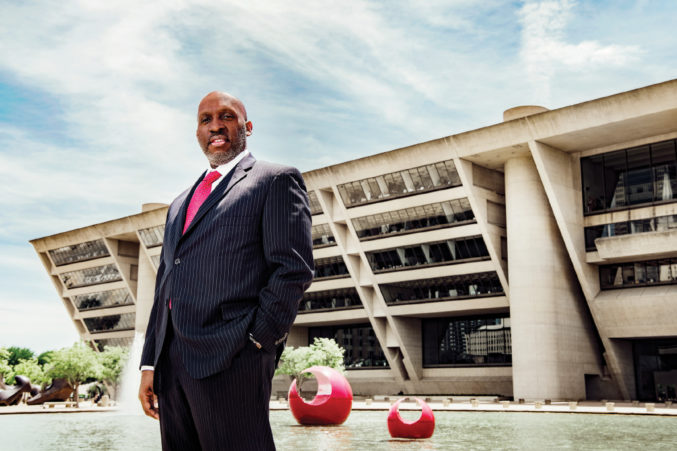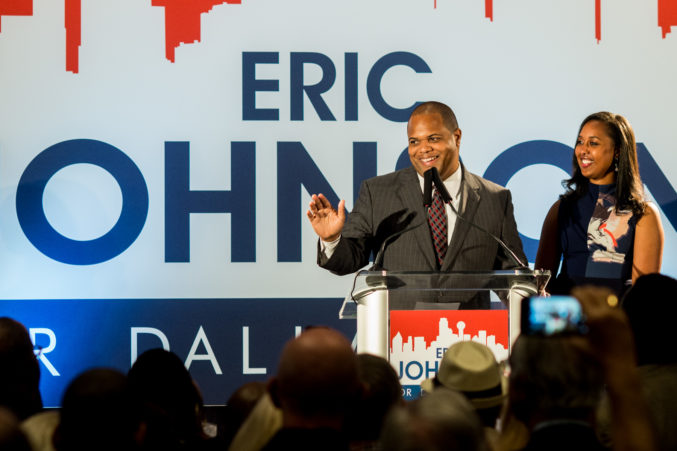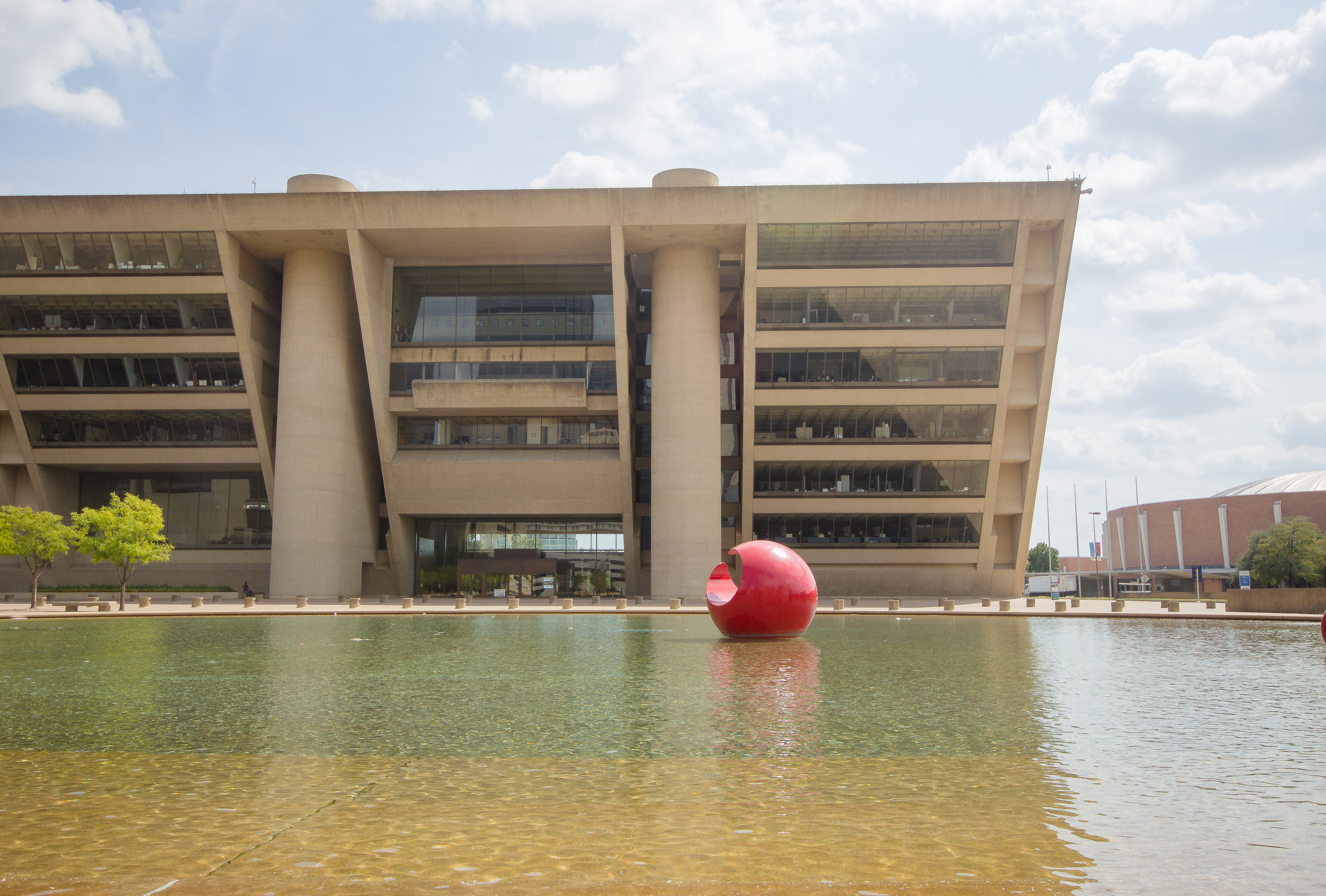Last week, the Dallas City Council held a five-hour special meeting that was one long embarrassment. On the surface, the meeting was called to take stock of the city’s vaccination registration and deployment efforts, which are still a mess. But the meeting was really a desperate attempt for the Council to confront the city’s elusive and divisive mayor.
Council members have complained for months that they can’t so much as get Mayor Eric Johnson on the phone to discuss city business. They find out about important issues via memo, press releases, and TV and radio interviews. Oak Cliff Councilwoman Carolyn King Arnold said she hasn’t spoken directly to Johnson in 13 months. It’s absurd. The once rising star of the Texas Democratic party can’t find time to talk to his colleagues, but he manages to schedule tours of Fair Park with far-right congressional representatives. (He also took tours with the Democratic delegation, including state Sen. Royce West and U.S. Reps. Eddie Bernice Johnson and Marc Veasey.)
Many of Johnson’s opponents blame the mayor’s behavior for the city’s current dysfunction. After all, Johnson could resolve some of this stuff with a few quick phone calls and a couple of gestures of goodwill.
The mayor isn’t interested. Instead, Johnson spends time during Council meetings drilling into the minutia with the city attorneys over the extent of his special powers under the city’s state of emergency. It looks like a power grab. But in recent weeks, I have become increasingly convinced that the problem at City Hall isn’t that the mayor is trying to grab too much power; it is that the Dallas City Charter doesn’t give him enough.
Here’s why.
Dallas’ Elected Officials Don’t Have Enough Power
In Dallas’ council-manager form of government, the mayor and council members don’t have much power when it comes to overseeing the functions of the city government. The real executive power at City Hall rests with the city manager. The manager hires and fires staff, sets the budget, and runs the administrative machinery.
The mayor is an executive in title only. In practice, he is just a 15th council member, the only one elected at-large for the entire city. The Council hires and fires the city manager, like a board of directors managing a CEO. This means that eight votes on the Council are enough to secure the city manager’s job. When the mayor and the Council are at odds, that effectively shields the city’s top executive. But even in the best of times, this system ensures that the city bureaucracy remains impervious to direct public accountability.
Without direct accountability, it is difficult for elected officials to sustain any forward momentum. The City Council crafts policies that can be forgotten by city staff. The manager delivers budgets to the Council virtually fully baked. City staff—and a never-ending parade of outside consultants—create plan after plan, but no elected official oversees their implementation. What city staffers—and people who do business with the city—know is that the secret to getting things done at 1500 Marilla is staff, not Council or the mayor. There is a reason why staff has been known to refer to the mayor and Council as “the summer help.”

Broadnax isn’t afraid to tell the mayor he doesn’t like one of his ideas.
And Yet, Elected Officials Have Too Much Power
The mayor’s only real power that distinguishes him from other council members is his ability to dictate the Council’s agenda. In the case of Eric Johnson, his tenure has been a master class on how to use the mayor’s limited powers to obstruct city business. It is often said that in order to get anything done at Dallas City Hall, you have to know how to count to eight, the number of votes to construct a majority on the Council. But the mayor’s power to set the Council’s agenda means that the mayor is the primary vote counter, the person best positioned to create legislative coalitions around the horseshoe.
But when a mayor isn’t interested in building coalitions, it becomes nearly impossible for the rest of the Council to get anything done. Not only is it difficult for individual council members to lead on individual policy initiatives, and particularly on citywide policy initiatives, but the mayor can obstruct them at every turn.
He sets the agendas, runs the meetings, and can reshuffle the council committees, all of which can greatly limit Council input into the legislative process. In most legislative bodies, the ruling majority possesses the power to set the legislative agenda. Not so in Dallas. Here, a disgruntled, isolated mayor doesn’t have the power to run City Hall, but he can virtually shut it down.
So, Council Members Retreat to their Fiefdoms
Frustrated, council members focus on their districts. At best, this means that skilled council members can realize district-wide progress on a wide variety of issues by working directly with staff and their communities. At worst, city management degrades into ward politics. Investments, services, and progress happen piecemeal, on a district-by-district basis, with little citywide or long-range planning to direct public investments. Some neighborhoods are left behind because of poor council-level leadership, among other issues. The city’s rampant neighborhood income inequality is a symptom of the way council districts can function like cities within the larger city.
Some council districts reap benefits, while poorer districts can become the dumping grounds for substandard housing, environmental catastrophe, and other predatory behaviors. This district-centric approach also means that council members can often wield tremendous influence on the permitting and zoning approval process in their districts, which transforms council members into mini ward bosses.
This is a contributing factor to the recent rampant corruption of elected officials, particularly in poorer southern Dallas neighborhoods. But it also sows dysfunction throughout the entire city.
And Weak Mayors Run a Parallel City Hall
Often, the mayor’s solution to limited administrative and political power is to create his or her own parallel government operated directly out of the mayor’s office.
It took Mayor Mike Rawlings a few years a few months (CORRECTION: Grow South launched in February 2012; Rawlings took office in June 2011) to realize that the best way to enact his vision for southern Dallas redevelopment was to essentially create a new city department inside his own office, an initiative he called GrowSouth. Johnson has initiated similar efforts, creating task forces on crime and innovation and entrepreneurship, as well as study groups for the Police and Fire Pension System. At best, these initiatives allow the mayor to bring to bear expert opinion to help inform policy matters facing the city. At worst, these efforts are redundant to the regular operations of City Hall and reflect a mayor’s perceived need to circumvent inefficient, dysfunctional, or resistant branches of city government to pursue his or her agenda.
Another way Dallas mayors can assert their agenda is via the bully pulpit provided by the office’s otherwise meaningless title. Mayors are not the city’s executives, but they can speak like executives directly to or on behalf of the city, particularly during momentous occasions.
But Mayor Johnson has shown how this platform can also be weaponized. Johnson’s press releases, proclamations, and use of social media often serve his political objectives under the guise of speaking on behalf of the city of Dallas. Some examples include the Nextdoor fiasco, public spats with County Judge Clay Jenkins, and the ongoing vaccine confusion.
The Nice, Old ‘Dallas Way’ Is Over
Some observers believe many of these problems can be solved if only the mayor and the Council learned to get along. I don’t believe so. Johnson’s combative politics are not a sign of dysfunction; they are the latest manifestation of the ways in which Dallas’ political climate has outgrown its dated system of government.
Dallas City Hall “worked” best during an era when the city’s de facto leadership was outsourced to a private sector consortium of civic leaders and business groups. Dallas’ council-manager system was adopted nearly a century ago to “professionalize” city business and eliminate the outsized Ku Klux Klan influence. But the current approach to local governance really dates to the wake of the assassination of John F. Kennedy, when the city’s business and civic leadership bound together to create a plan that would rebrand and re-market Dallas after a nation labeled it the “city of hate.”
The city’s agenda wasn’t set by elected officials or city bureaucrats but rather by marketing and public relations agencies, prominent CEOs, and wealthy families. It was expected that elected city officials adopt these ideas and attitudes, play nice, work together, and adhere to the “Dallas Way.” For decades, elected officials were handpicked by the city’s business establishment. Even after the city established the current 14-1 council system in response to demands for more diverse representation on the Council, powerful business interests were able to exert outsize influence on who won newly created council seats in southern Dallas.
But this system relies on a governing consensus formed outside the political process. That consensus has fractured as the city’s politics become more diverse, inclusive, and contested. There have always been a few squeaky wheel council members. But council members who questioned the oligarchs—on issues like the Trinity Toll Road, for example—were isolated, shunned, and ostracized. Up until a few years ago, it was rare for a sitting council member to be challenged during elections. That has changed. Scott Griggs was nearly elected mayor precisely because he fought the establishment on the Trinity Toll Road. There are already dozens of candidates signed up to run against sitting council members this May.
The irony is that this increased political discord was the reason the civic establishment recruited Eric Johnson to run for mayor. The former state legislator ran on a platform of restoring harmony and manners to city government, but he has emerged as the most divisive and combative political figure in a generation of city politics.
This has many of Johnson’s former supporters wringing their hands and wishing the mayor might disappear—perhaps to a cushy political appointment in the Biden administration—and allow a real peacemaker to take his place. But I believe the fallout was inevitable.
Much of Johnson’s frustration as mayor can be traced back to the fact that it is a pretty crummy job in the first place, one that doesn’t give him any real agency to run the city and assumes he will chaperone a Council that doesn’t see eye to eye with him on many issues. Johnson was chosen by the old city interests, but Dallas’ elected representatives can no longer be managed from outside City Hall.

The Only Solution Is a Strong Mayor System
How does Dallas fix this? Give Johnson the power he craves.
Dallas’ governmental structure sets up a system of accountability in which the wrong officials are charged with holding the wrong people accountable. The city manager is the top executive, and he is secure if he has the backing of just eight members of the City Council. The mayor needs to work with Council in order for the city’s legislative body to get anything done, but he can only be held to account by a citywide vote held every four years—double the term of council members. There is no way for a mayor to hold the manager to account, and there is no way for the Council to hold the mayor to account.
A strong mayor system would fix these two fundamental problems. In such a system—taking the governments of the cities of Houston and Seattle as examples—the mayor would replace the city manager as the top executive, and the Council would remain the city’s legislative body. A council president would be elected by sitting council members to take over the mayor’s current job of setting agendas, creating committees, and running meetings. This accomplishes a few important things.
Under a strong mayor system, the mayor would hire and fire the city’s administration and run the government. Dallas voters would hire and fire the mayor. This would make the mayor the boss; elected officials would no longer be the “summer help.” And, rather than eight council votes, the boss would be held accountable for his performance directly by the voters of Dallas.
Removing the mayor from his current council duties would remove the current legislative impasse. Council agendas and committees would be set by a council president, who is appointed by a majority vote of the Council. This makes the person who runs council meetings directly accountable to the council members he or she is supposed to work with. This creates an incentive for forging compromises and building coalitions that does not currently exist in the Dallas system.
In a strong mayor system, the mayor is able to set an executive agenda for the city, placing more power in an elected official to look out for citywide interests, including ensuring that the city’s interests are well represented on regional planning boards and public transit, as well as holding staff to following policy laid out in comprehensive plans. The mayor would no longer have a reason to run parallel initiatives out of the mayor’s office. And when the mayor spoke for the city, he or she would be doing so not as a glorified 15th at-large council member, but as the city’s top executive representing, and responsible for, the operations of the city’s government.
A strong mayor government would also eliminate the accountability loophole that allows council members to operate their districts like mini fiefdoms. Under the current system, because the city manager—staff’s boss—keeps his or her job with eight votes of the Council, there is an incentive for staff to keep council members happy.
This creates a potentially unethical dynamic when council members deal directly with city staff on projects in their district. In a strong mayor system, staff would report to the mayor, and so the mayor would be able to provide oversight of how staff and Council conduct city business.
Is Dallas Ready for a Strong Mayor?
The last time the city considered reforming its system of government was in 2005, when a strong mayor system was rejected by voters. The defeat of the referendum was largely driven by record turnout among southern Dallas voters who feared that a strong mayor system would undo progress made for African American representation under the 14-1 system. There is a lot to unpack in that political dynamic and history, but for now we only need to look at the last two decades: a slew of imprisoned southern Dallas politicians, environmental catastrophes like Shingle Mountain, deepening poverty, and lack of promised investment in the so-called southern sector. Whatever the perceived advantages of 14-1, the last 16 years have not borne them out.
The more cynical opposition to the 2005 vote boils down to the fact that Dallas’ weak government plays to advantage of a lot of powerful vested interests who benefit by being able to manipulate a broken system. But what the last 16 years have shown is that Dallas is not the home to the “timid political culture,” as Texas Monthly put it at the time, that drove the opposition to the strong mayor vote back in 2005. In fact, the current battles between the mayor and the Council—and the various battles shaping up in the upcoming May election—offer evidence that Dallas is no longer a city whose politics can be shaped by a handful of local politicians operating in lockstep with the business and civic community.
Dallas isn’t the city it was in 2005, and it certainly isn’t the city it was in 1965. But its city government is still holding Dallas back from the city it needs to be in 2025 or 2065. To rise to meet the challenges of poverty, housing, disinvestment, environmental change, inequality, inequitable economic opportunity, urban policing, and myriad other issues, that system of government must change.
As the mayor and City Council continue to bicker and squabble, to play out political wars in statements and on social media, and to hold five-hour specially called Council meetings that accomplish nothing and go nowhere, let’s not mistake the participants in that dysfunction for the governmental dysfunction that is its root.
Instead, it’s time to start gathering signatures to force a vote, not on a new mayor or a new Council, but on a new Dallas.





